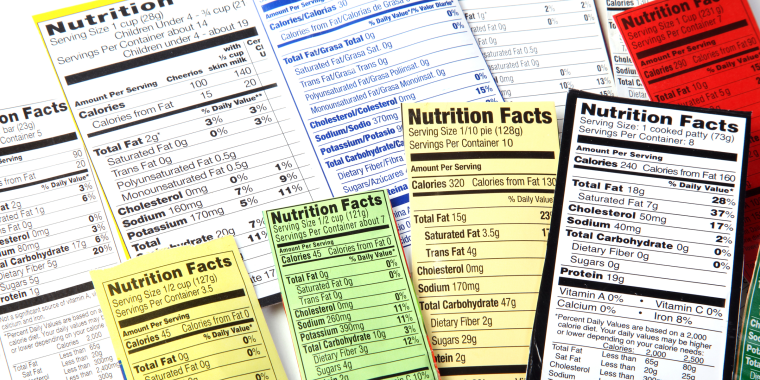As the coronavirus pandemic continues to impact the availability of certain foods across the country, the U.S. Food and Drug Administration recently released new guidance that allows food producers to exercise more flexibility when it comes to labeling their products. Manufacturers and vending machine operators will now be able to make what the agency calls "minor formulation changes" to foods in an effort to ease the stress of supply chain disruptions due to COVID-19.
Although the new guidelines, which were released Friday, will likely make it easier for Americans to continue getting the products they're used to seeing on store shelves, consumer advocacy groups are warning that the changes may result in potentially dangerous outcomes for those with food allergies.
According to the FDA's announcement, an ingredient can be changed without it being updated on the label's ingredient list as long as it "does not cause any adverse health effect." Examples include "food allergens, gluten, sulfites or other foods known to cause sensitivities in some people."
The ingredient being omitted or substituted cannot be a major ingredient in the product and can make up only 2% or less of the food. Additionally, characterizing ingredients (such as raisins in raisin bread) may not be changed. The omission or substitution cannot have an impact on the overall nutrition of the product, either.
Download the TODAY app for the latest coverage on the coronavirus outbreak.
The FDA provided several examples of how the relaxed labeling rules may affect certain goods. Green peppers, for instance, may be left out of a pre-packaged vegetable quiche. The substitution of canola oil for sunflower oil in a product would also be permitted since they both contain similar types of fats and neither is a common allergen. Unbleached flour may likely be substituted for bleached flour as the bleaching agent for flour continues to be in short supply.
The latest guidelines follow a similar announcement made by the agency in April when it temporarily relaxed several restrictions on how eggs can be packaged and labeled in order to allow the highly in-demand product to get to grocery stores faster.
Though the changes are meant to ensure the availability of packaged foods keeps pace with consumer demand, some have expressed safety concerns over the announcement. Dave Bloom, CEO of SnackSafely.com, told TODAY Food that these changes are a big deal for those in the allergy community.
"If you have a food allergy, the substitution of ingredients can be extremely dangerous and can cause anaphylaxis," he explained. "The fact that they (the FDA) say 2% or less of an ingredient is changed means nothing because even a little trace of an allergen can cause a reaction and send someone to the hospital."
Bloom also said it doesn't matter if the FDA promises well-known allergens aren't a factor because for those with less common allergies it will be "the wild west" with consumers not knowing what's in their food. He was also skeptical about the timing of the announcement.
"Why would the FDA release this on a Friday evening before a holiday weekend with no opportunity to comment? It's kowtowing to big food," he said. Bloom said there are other things the FDA could do to ease current problems with the supply chain that would not be as risky to consumers.
"There are 32 million Americans that have a food allergy — that's one in 10 of us that are put at risk by this," he said.
The FDA did not specify how long the relaxed guidelines would remain in effect.
Bonnie Taub-Dix, RDN, author of "Read It Before You Eat It - Taking You from Label to Table," told TODAY that whenever ingredients are changed without people being informed there is the potential for trouble.
"We have all had to make changes (during the pandemic), swapping ingredients and that’s expected," she said. But when it comes to the labels on foods being purchased, Taub-Dix said there should always be transparency. "There are sensitivities that may not be as common, but if anyone is going to suffer, that's a problem."
While Taub-Dix added that the ruling does not involve foods considered to be major allergens (such as milk, eggs, fish, tree nuts, wheat and soy beans), what she finds troubling is the precedent it sets.
"What scares me the most is that this temporary loosening of the laws will stick around for longer than should be permitted," she said. "We don't want the noise of politics to take precedence over the needs of people."
While at the grocery store, consumers should stick with brands they are familiar with, Taub-Dix advised. She added that if a product is labeled as being "free" of an ingredient, such as "gluten free," there should be no concern that a gluten-containing agent would suddenly be added to it.
"If you're unsure, contact the manufacturer," she advised.
Bloom, whose daughter is allergic to both peanuts and eggs, said he will continue to shop with the manufacturers that work with his advocacy group.
"We are confident in our partner manufacturers and will continue to purchase from them," he said. "For other things, we will be very cautious."


